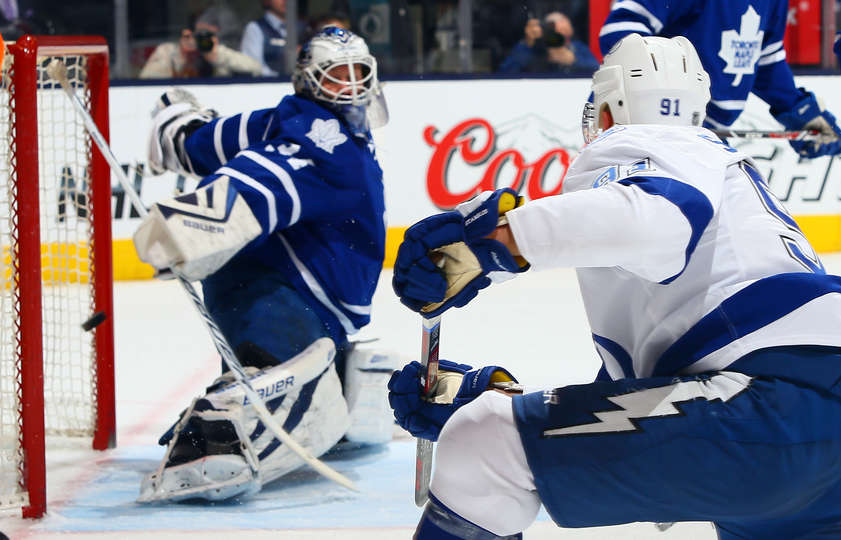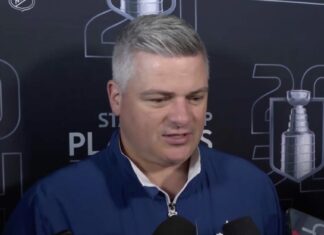James Reimer and the Toronto Maple Leafs will go to arbitration to determine what the embattled Leafs goalie is worth. Hint: he’s getting a raise.
In my last article, I discussed the upcoming Club-elected salary arbitration of Ryan O’Reilly and the Colorado Avalanche. The flipside of Club-elected salary arbitration is Player-elected salary arbitration, which procedurally is the mirror image of Club-elected arbitration with the Player driving the process and being given the opportunity to present his case first rather than the Club.
Yesterday, CBC’s Elliotte Friedman broke the story on Twitter that James Reimer was among the first players to file for Player-elected salary arbitration. Under the terms of the Collective Bargaining Agreement (“CBA”), specifically Article 12.2, Reimer had until 5pm on July 5th to provide notice of his election. Without reading too much into the situation, it seems clear that Reimer and his agent Ray Petkau are intent on sending a message to the Toronto Maple Leafs that Reimer’s time as an affable back-up in hockey’s Centre of the Universe is over one way or the other.
Reimer is a Group 2 Restricted Free Agent (“RFA”) because the Toronto Maple Leafs extended him a qualifying contract offer of $1.6 million dollars in accordance with Article 10.2(a)(ii)(C) of the CBA, which required the Club to offer him 100% his actual salary from the preceding season. This is Reimer’s final off-season as an RFA as he’ll be 27 years of age before June 30th of next year, meaning he will be a Group 3 Unrestricted Free Agent (“UFA”) – as provided by Article 10.1 – whenever his next contract expires.
Now that James Reimer has filed for player-elected salary arbitration, what happens next?
Generally, Article 12.9(c) would allow the Toronto Maple Leafs (as the party being brought to arbitration) to elect whether the awarded contract would span one or two years; however, because Reimer is eligible to become a UFA next offseason the arbitrator will only be permitted to award a one year contract. Meaning — barring a negotiated agreement — James Reimer will be a UFA at the end of the 2014-2015 season, at which time he’d undoubtedly shop his services to a club needing a viable starting goaltender.
As I described in my last article, during the arbitration the Player and the Club will be permitted to lead evidence about Reimer’s statistical performance in previous seasons and also be allowed to lead evidence about allegedly comparable players’ performance for the sake of comparison. The comparison evidence isn’t unlimited, however, and Article 12.9(g)(iii)(A) states that the Player and Club are only allowed to introduce as evidence contracts which were signed when the relevant player was also a Group 2 RFA.
Although it’s only conjecture at this point, I’d suggest that the list of comparators for Reimer’s arbitration hearing is likely to include (at least) the following goaltenders who signed their current deals with their respective Clubs as Group 2 RFA’s.
James Reimer Comparables
| Goaltender | Comparator(Regular Season) | GP | W | L | OT | GAA | SP (%) | SO | Current ContractYears & AAV |
|---|---|---|---|---|---|---|---|---|---|
| Cory Schneider | Career | 143 | 71 | 41 | 20 | 2.12 | 0.925 | 12 | 3 x $4.0 million |
| Season deal was signed | 33 | 20 | 8 | 1 | 1.96 | 0.937 | 3 | ||
| Steve Mason | Career | 300 | 133 | 119 | 34 | 2.79 | 0.907 | 23 | 2 x $2.9 million |
| Season deal was signed | 61 | 33 | 18 | 7 | 2.5 | 0.917 | 4 | ||
| Jonathan Bernier | Career | 117 | 55 | 39 | 13 | 2.51 | 0.918 | 7 | 2 x $2.9 million |
| Season deal was signed | 14 | 9 | 3 | 1 | 1.88 | 0.922 | 1 | ||
| Kari Ramo | Career | 88 | 28 | 36 | 14 | 3.03 | 0.902 | 2 | 2 x $2.75 million |
| Season deal was signed (KHL) | 40 | 26 | 9 | 5 | 2 | 0.929 | 2 | ||
| Ben Scrivens | Career | 72 | 27 | 30 | 6 | 2.69 | 0.917 | 6 | 2 x $2.3 million |
| Season deal was signed | 40 | 16 | 16 | 4 | 2.55 | 0.922 | 4 | ||
| Braden Holtby | Career | 105 | 60 | 31 | 8 | 2.6 | 0.919 | 11 | 2 x $1.85 million |
| Season deal was signed | 36 | 23 | 12 | 1 | 2.58 | 0.92 | 4 | ||
| James Reimer | Career | 140 | 65 | 48 | 15 | 2.85 | 0.914 | 11 | |
| Last season | 34 | 12 | 16 | 1 | 3.29 | 0.911 | 1 | Expiring deal: 3 x $1.8 million |
Interestingly, Reimer has played only three fewer games than Cory Schneider, and has only one less shutout despite playing for a team that is defensively porous, and with the exception of one lock-out shortened season he has suffered from bottom-dwelling penalty killing proficiency. Kind of makes you re-evaluate what you think you know about this goaltender, doesn’t it?
Reviewing the comparative statistics above, and as the lowest compensated goaltender on the list, it’s clear that Reimer is due for a raise. If I’m Reimer’s agent, I’m looking at the Kari Ramo, Steve Mason and Jonathan Bernier contracts and suggesting to the arbitrator that Reimer’s statistics (GAA, SV%, SO’s) are generally comparable or better than those players, over a greater sample size (excluding Mason), and he is therefore deserving of a contract in the $2.75 – $2.9 million range, which would be a 72-82% raise (you’re welcome, James). If I was representing Reimer, I would also try to discount the relevance of Holtby’s current $1.85 million AAV contract by suggesting that Holtby’s contract is roughly equivalent to the last contract that Reimer signed, which was a “show-me” contract, and that having maintained better than average starting goaltender statistics over the course of that contract, Reimer is now deserving of a contract in line with the other three above-mentioned starting goaltenders.
Consider for a moment: In a down 2013-2014 season — in which Reimer was “slighted” by his coach, yet again had his bell rung by a hit to the head, and played under the constant fear of getting the hook in favour of his Club’s newly acquired masked-savour — Reimer’s SV% of .911 was still superior to Mason’s career SV%. That Reimer maintained his play despite these distractions and remained a popular and positive teammate would also be evidence I’d lead in supporting his case. With all of that in mind, it wouldn’t surprise me at all to see Reimer awarded a contract somewhere between Scrivens’ and Mason’s for around $2.5 million for next season, allowing him to become a UFA the following off-season.
The other thing to note is that, as long as Reimer is awarded less than $3.5 million by the arbitrator — which I believe is a virtual certainty — the Toronto Maple Leafs will not have walk-away rights under Article 12.10, and will be forced to live with the one year contract. Clearly Reimer is going to walk after this contract if this proceeds to arbitration, so from an asset maximization perspective this is the worst case scenario for the Toronto Maple Leafs, who would clearly love to get a decent return for a traded Reimer, and are most likely to do so if he’s inked to a reasonable contract with term beyond next season.
From the Leafs perspective, then, the best thing the Club can do is try to negotiate a multi-year (two or three) agreement with Reimer with an AAV around $2.5-2.9 million. This kind of contract makes sense for a number of reasons; not the least of which is maximizing his value in a potential trade, but it also recognizes the fact that Jonathan Bernier has never played more than 55 games in an NHL season (and didn’t even make it through 55 games unscathed), and that James Reimer has demonstrated that he can be a starting goaltender in the NHL over a 20% greater sample size than Bernier with a comparable (.914 vs. .918) SV%. The other upside to signing such a contract (assuming Reimer was amenable to and willing to stay) is that it would give the Toronto Maple Leafs leverage over Jonathan Bernier in his up-coming contract negotiation in which he’ll certainly be seeking an increase on the $2.9 million AAV that he’s currently making on his expiring two-year deal. Without Reimer or another viable starting goaltender in place, the Leafs won’t have a leg to stand-on.
In other words, pick up the phone Mr. Nonis.



































